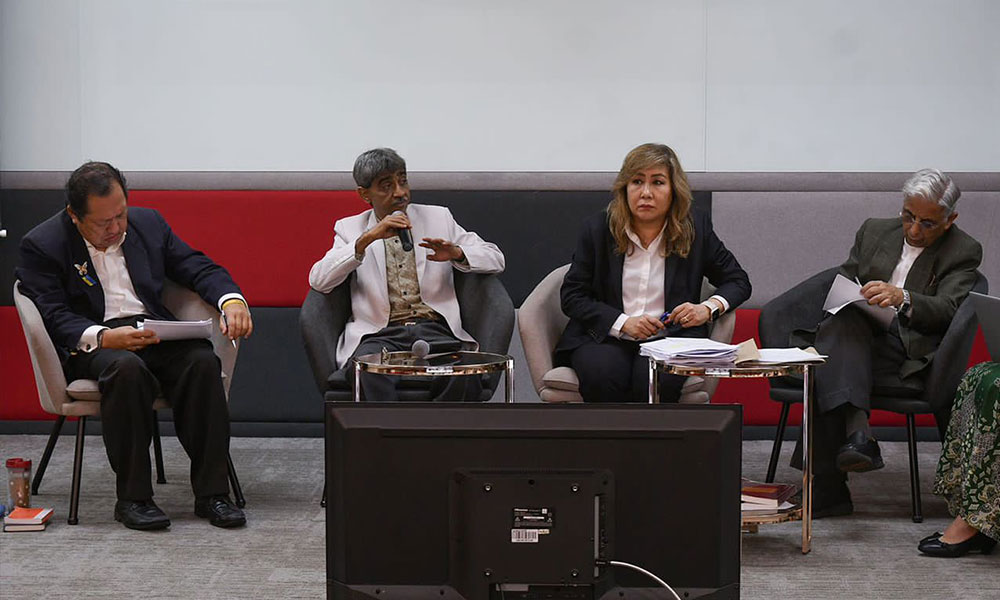A majority verdict with a dissenting judgment should not be seen as being of a lower decision than a unanimous decision by a three-member or five-member appeal bench, a senior lawyer said today.
Lawyer Haniff Khatri Abdulla, who spoke as a panellist at a Bar Council public forum today, cited the Federal Court's majority 4-1 verdict that denied former prime minister Najib Abdul Razak's application to review his ongoing 12-year jail term in the RM42 million SRC International corruption case.
"We can't expect all judges to have the same opinions. One should not look at dissenting judgments as tainting the majority decision.
"Just because there is a dissenting judgment, it does not render the 4-1 verdict as a lower decision than a unanimous decision," Haniff (above) said.
Following the verdict, Najib's supporters, including those from Umno, described the dissenting judgment as providing "new hope" for his freedom after the end of Najib's legal battle in the SRC case.
The public forum, titled "MACC, the ex-PM, and independence of the judiciary", also featured Malaysian Bar president Karen Cheah, constitutional expert Shad Saleem Faruqi and human rights lawyer Andrew Khoo.
Also present in the audience was Najib's lead counsel Muhammad Shafee Abdullah.

Najib's supporters also noted that the dissenting judgment came from Chief Judge of Sabah and Sarawak Abdul Rahman Sebli who chaired the five-member apex court panel.
Haniff, however, countered that the seniority of judges in one panel has no role in influencing its decision as each member is at liberty to write their own judgments.
"Seniority stops at the doorstep of the hearing hall. When you sit to hear a case you are all equal.
"You're at liberty to write your own judgement. So there's nothing weird about it," he said.
Importance of ‘finality’
Haniff further pointed out Abdul Rahman had no dissenting opinion regarding a key point in the majority ruling: That it disagrees with the defence’s contention that SRC trial judge Mohd Nazlan Mohd Ghazali had a conflict of interest.
The defence had argued that Nazlan once served as general counsel at Maybank Investment Bank Bhd and must have advised the bank on 1MDB-related matters.

Cheah, who echoed Haniff's views that Abdul Rahman did not touch on the main appeal, stressed the importance of "finality" in any legal proceedings.
"To allow another review could set a dangerous precedent because we wish to have finality.
"Unless there's a point not reviewed (during the first review)," she said while conceding there is no provision that prohibits the filing of a second review.
Earlier this month, the Umno supreme council unanimously decided to apply for a royal pardon for Najib.
Shad Saleem said the Yang di-Pertuan Agong can consider many relevant issues when delivering his decision on the advice of the Pardons Board.
In Najib’s case, this could include his other charges that are still pending in court.
Shad Saleem said, unlike other jurisdictions where a pardon can be granted in advance of a conviction, such a decision would be unconstitutional in Malaysia.
Meanwhile, at a press conference later, Cheah said that the issue of conflict of interest and the Judges' Code of Ethics 2009 is not within MACC’s jurisdiction.
"These are generally matters pertaining to corruption, abuse of power and position, and other offences which are contemplated for and specified under the MACC Act.
"The conflict and the Judges' Code of Ethics 2009 are not the matters that the Act was set up for or intended to regulate,” she added.
Cheah also said that moving forward, lawmakers should not be raising issues about the conduct of judges in either House of Parliament. - Mkini




No comments:
Post a Comment
Note: Only a member of this blog may post a comment.